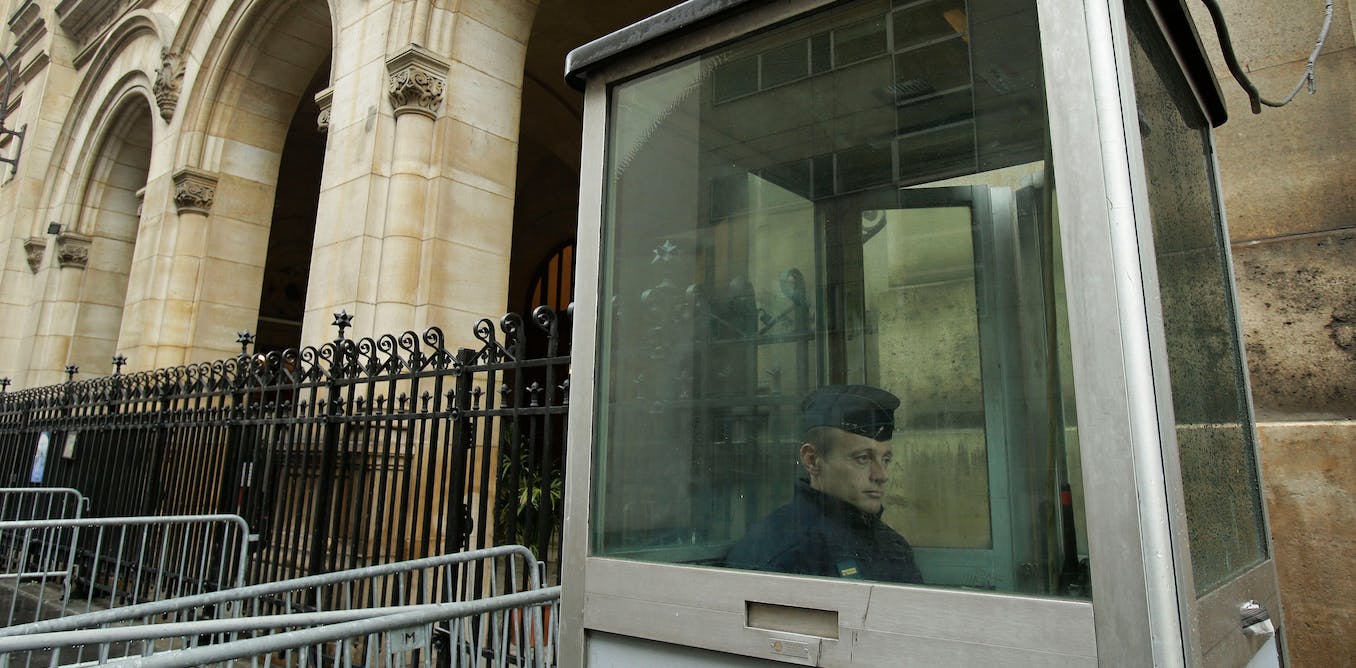The terrorist attack in Israel on October 7 and the subsequent war in Gaza have led to increased attacks on Jews around the world. This is not a new trend. When conflict happens in Israel and Palestine the result is often rising numbers of attacks and threats.
In 2016, a study by the European Union Agency for Fundamental Rights stated that “events in the Middle East can trigger antisemitic sentiment in the EU”. This was clear in western Europe, and less so in Hungary and Poland.
Increased conflict or wars in the Middle East do not create “prejudice against or hatred of Jews” (one definition of antisemitism) but trigger a pre-existing negative attitude that can manifest itself in threats.
When news spread on October 7 of the deadly attack by Hamas, it appeared to lead to instances of people celebrating the killings in some countries, including in Sweden and the UK.
This was followed by a wave of protests over Israel’s military response in Gaza, when thousands were killed. In France and in Germany, pro-Palestinian demonstrations were banned because it was suspected that these could degenerate into antisemitism.
This restriction on the right to protest has been criticised and unauthorised rallies in support of Palestine have been organised in these countries.
In many countries, the police or organisations working on the issue report a dramatic increase in the number of antisemitic incidents. According to advocacy group the Anti-Defamation League, antisemitic incidents in the US rose by 388% in slightly over two weeks after the attack by Hamas.
London’s Metropolitan Police said on October 20 that the city had seen a 1,353% increase in antisemitic offences that month compared to the same month last year, and a 140% increase in Islamophobic offences.
Many of these are verbal threats in person and online, but there are also reports of physical attacks on synagogues and other Jewish institutions, for example in Portugal and Spain.
Some events planned by Jewish organisations have been cancelled due to fears for the safety of participants, including in Barcelona. In Dagestan a violent mob went looking for Jews at the airport in the capital Makhachkala, and surrounded an aircraft that had come from Tel Aviv.
In the US, some Jewish students and teachers have criticised the wave of support for Hamas and crude attacks against Jews that have happened on some university campuses. For instance, at Cornell University in New York state, the university police are investigating threats to kill Jewish students. The FBI was called in to ensure security.
Pattern of antisemitism
During this century, each violent escalation of the Israeli-Palestinian conflict has led to increased antisemitism in many countries. Statistics from the Service de Protection de la Communauté Juive (Jewish Community Protection Service) in France show how antisemitic incidents were at a low level in the late 1990s but grew dramatically in the autumn of 2000 when the second intifada, a major uprising in the Palestinian occupied territories, began.
The same organisation’s statistics showed that antisemitic incidents (threats and hate graffiti) in France increased by 101% in 2014 compared to the previous year, and violent acts (physical attacks, vandalism) increased by 130%. The month with by far the highest number of antisemitic acts was July, the month when a war in Gaza broke out.
The pattern is the same in other countries. In the UK the Community Security Trust recorded “a record number of antisemitic incidents in 2014, largely due to the increase in antisemitism during the conflict in Israel and Gaza in July and August”.
Relationships with the Middle East
When in December 2001 I interviewed Dalil Boubakeur, rector of the Great Mosque of Paris, he said that the relationship between Jews and Muslims in France is completely dependent on developments in the Middle East. With the region showing no signs whatsoever of moving towards a just and stable peace, the question becomes how Jews in other countries can feel safe, especially when the conflict is dramatically aggravated, as at the moment.
In countries with both Jewish and Muslim populations there are organisations for dialogue and understanding. As a rule, they work well with one exception: opinions on the Israeli-Palestinian conflict diverge sharply. Participants in discussions tend to focus on other things. But right now, this is not possible.
Some organisations have issued statements appealing for calm and saying their work will continue. But clearly this kind of dialogue is now facing great strain.
In Sweden’s third largest city, Malmö, where the number of Jews has decreased dramatically in recent decades, there has been for several years a praised dialogue work between Jews and Muslims, Amanah.
It is now paused. Those responsible believe that in today’s intense atmosphere it is not possible to meet.
Traditional antisemitic tropes
As Israel defines itself as “the Jewish state” some people seem to think that all Jews, independent of citizenship and relationship to Israel, are responsible for what Israel does.
This is combined with harmful stereotypes of Jewish manipulation and control of powerful institutions that have been used for centuries to stir up sentiment against Jewish people. The media is often accused of being pro-Israel as it is “controlled by the Jews”.
Sometimes criticism of Israel is drawn from widespread old antisemitic tropes. It is therefore not surprising that the fabricated document from 1903, The Protocols of the Elders of Zion about an alleged Jewish plot for world dominion, is still widespread in the Middle East.
As we witness a surge in conspiracy theories circulating online, it is worth mentioning that the history of antisemitism is full of these. Ideas about Jewish manipulation – spread among a wider segment of the population – can also be used in relation to the Israeli-Palestinian conflict. They “explain” things such as the US support for Israel and the positioning of western media.
All of these historic deeply embedded conspiracies and antisemitic beliefs feed into a fevered atmosphere where Jews can feel threatened wherever they live, and this is, unfortunately, unlikely to disappear.


